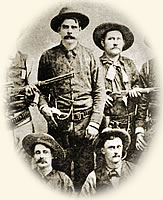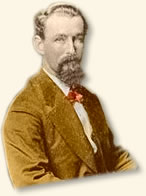|
Encounter with the
Texas Rangers, 1876
It was May 25, 1876. A band of forty Texas Rangers rode out of
Laredo and headed north to the infamous Nueces Strip. Their mission
was to find, kill or capture John King Fisher, leader of a band
of cattle rustlers and cut-throats that had been terrorizing the
area. The Rangers were members of a select group known as the Special
Force. Led by the legendary Leander McNelly, the Special
Force was tasked with bringing law and order to an area of South
Texas that lay between Corpus Christi and the Mexican border.

Texas Rangers, 1882 |
McNelly had hand-picked each member of the Special Force that
had been organized a year earlier. Each was expected to provide
his own horse, armament and gear. In return, the state provided
meals, ammunition and a small salary. The tactics they used to
accomplish their mission, including crossing the Mexican border
in pursuit of their quarry and summary execution, did not always
follow the letter of the law, but they were effective. The Special
Force was dissolved in 1877 and its members absorbed into other
units of the Texas Rangers.
Napoleon Augustus Jennings was a member
of the group of Texas Rangers who rode out to capture John King
Fisher. We join Jennings’ story as the Rangers arrive in
Laredo:
"It was May 25, 1876 when we arrived at Laredo, and we camped near
the town for three days. Then we continued our journey on toward
the Nueces River. . . [It was here that] we learned first about
the desperado, King Fisher, and his notorious gang of horse thieves,
cattle thieves, and murderers.
Fisher lived on Pendencia Creek, near the Nueces, in Dimmit County.
He had a little ranch there, and about forty or fifty of his followers
were nearly always with him. These men, too lazy or too vicious
to work for themselves, preyed upon the substance of the toiling
settlers. They stole the ranchmen's horses and cattle and robbed
their corn cribs, and they did not stop at murder to further their
ends.
. . . Fisher was about twenty-five years old at that time, and
the most perfect specimen of a frontier dandy and desperado that
I ever saw. He was tall, beautifully proportioned, and exceedingly
handsome. He wore the finest clothing procurable, but all of it
was the picturesque, border, dime novel kind.
. . . He was an expert revolver shot, and could handle his six-shooters
as well with his left hand as with his right. He was a fine rider,
and rode the best horses he could steal in Texas or Mexico. Among
the desperadoes, the stolen horses were known as ‘wet stock’ that
is, horses which had been stolen in Mexico and swum across the
Rio Grande to Texas, or vice versa.”
Finding Fisher’s ranch house, the Texas Rangers split into
two groups and approach from different sides:
“There were only nine of the desperadoes at the house at
the time, but a precious gang of outlaws and cutthroats they were.
Here are their names: J.K Fisher, known as ‘King’ Fisher;
Burd Obenchain, alias Frank Porter, wanted for murder and cattle-stealing,
as desperate a ruffian as ever the Texas border knew; Warren Allen,
who shot a Negro in a barroom at Fort Clark for drinking at the
same bar with him, and then deliberately turned and finished his
own drink and ordered another; Bill Templeton, horse thief; Will
Wainwright, Jim Honeycutt, Wes Bruton, Al Roberts, and Bill Bruton.
All of them were ‘wanted’ for numberless crimes.
A few weeks before we arrested them, King Fisher and Frank Porter,
by themselves, stole a herd of cattle from six Mexican vaqueros
who were driving the herd for its owner, near Eagle Pass. Fisher
and Porter rode around the herd and killed every one of the six
Mexicans. The vaqueros were all buried together, and I saw the
place where they were buried. It was known as ‘Frank Porter's
Graveyard.’
. . . at a prearranged moment, all of us dashed for the house
at full speed, six-shooters in hand. A fence was in our way, but
the horses went over it like hunters after the hounds, and before
Fisher and his men perceived us we were within a hundred yards
of the place.
Most of the desperadoes were playing poker under the shed-like
extension in front of the ranch house. They jumped up and started
for the house proper to secure their arms, but before half of them
succeeded in getting inside the door, we were around them and our
six-shooters were cocked and pointed at their heads.
'You'll have to surrender or be killed!' cried McNelly
to Fisher, who stood halfway out of the door, with the lieutenant
of his band, one Burd Obenchain, but known to his companions as
Frank Porter.
Fisher did not move, but Porter half raised his Winchester, and
coolly looked along the line of Rangers.

Captain Leander McNelly
of the Texas Rangers |
'Drop that gun!' yelled McNelly. 'Drop it, I
say, or I'll kill you.'
Porter looked McNelly squarely in the eyes, half raised his rifle
again, and then slowly dropped it to his side, and with a sigh
leaned it against the side of the house.
'I reckon there's too many of yer to tackle,' he said,
calmly. 'I only wisht I'd a-seen yer sooner.'
The other men gave up without a struggle. They were badly frightened
at first, for they thought we were members of a vigilance committee,
come to deal out swift justice to them and hang them by lynch law.
They were agreeably disappointed when they discovered we were the
Rangers, officers of the law of Texas.
. . .We took the men with us at once to Eagle Pass and put them
in jail there. We tied the feet of the prisoners to their stirrups
and then tied the stirrups together under the horses' bellies.
We also tied the desperadoes' hands to the pommels of their saddles
and led their horses.
Before we started, Captain McNelly told us, in the hearing of
the prisoners and of Fisher's wife-a pretty girl, with wonderfully
fine, bold black eyes-that if any of our prisoners attempted to
escape or if an attempt was made to rescue them, we were to kill
them without warning or mercy. That is, or was, known on the frontier
as La ley de fuga, the shooting of escaping or resisting prisoners.
It was well understood among the outlaws, and was a great protection
to the officers who were compelled to escort prisoners over long
distances through the sparsely settled country. The knowledge of
this condition of the border prevented members of a desperado gang
from attempting to rescue prisoners, for such an attempt meant
instant death to the captives."
References:
This account appears in Jennings, N.A. A Texas Ranger (1898, republished 1992); Gillett, James B., Six Years with the Texas Rangers (1925, republished 1963).
How To Cite This Article:
"Encounter with the Texas Rangers, 1876" EyeWitness to History, www.eyewitnesstohistory.com
(2007).
|






